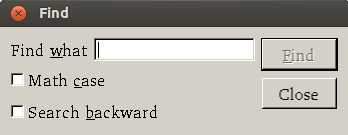标签:
第八章 Qt GUI之对话框使用
对话框可以是模态(modal)的或非模态(modeless)两种。当我们在一个用户界面程序里面对一个对话框(比如选择文件对话框)的操作没有结束前,界面的其他窗口无法操作,遇到的这个对话框就是模态对话框,而当我们在一个字处理软件中利用查找和替换对话框时,可以在字处理软件和查找替换对话框之间切换进行交互,这就是个非模态对话框。
先来看一下QDialog类的继承关系,如下图所示。

QDialog从QWidget继承,然后它下面又被Qt的内置对话框类(QFileDialog选择文件或目录对话框、QFontDialog选择字体对话框、QMessageBox消息提示对话框等)继承。用户要实现自己的对话框,需要继承自QDialog类,并包含头文件<QDialog>。
1、实现自己的对话框类
实现一个Find(查找对话框),它的运行效果如下图所示,这将实现一个拥有自主权的对话框。

程序清单如下:
finddialog.h
1 #ifndef FINDDIALOG_H 2 #define FINDDIALOG_H 3 4 #include <QDialog> 5 #include <QCheckBox> 6 #include <QLabel> 7 #include <QLineEdit> 8 #include <QPushButton> 9 10 class FindDialog : public QDialog 11 { 12 Q_OBJECT 13 14 public: 15 FindDialog(QWidget *parent = 0); 16 ~FindDialog(); 17 18 signals: 19 void findNext(const QString &str, Qt::CaseSensitivity cs); 20 void findPrevious(const QString &str, Qt::CaseSensitivity cs); 21 22 private slots: 23 void findClicked(); 24 void enableFindButton(const QString &text); 25 26 private: 27 QLabel *label; 28 QLineEdit *lineEdit; 29 QCheckBox *caseCheckBox; 30 QCheckBox *backwardCheckBox; 31 QPushButton *findButton; 32 QPushButton *closeButton; 33 }; 34 35 #endif // FINDDIALOG_H
finddialog.cpp:
1 #include <QtGui> 2 #include "finddialog.h" 3 4 FindDialog::FindDialog(QWidget *parent) 5 : QDialog(parent) 6 { 7 label = new QLabel(tr("Find &what")); //tr()函数是把它们翻译成其他语言的标志,“&”来表示快捷键(Alt+W) 8 lineEdit = new QLineEdit; 9 label->setBuddy(lineEdit);//设置行编辑器为标签的伙伴,按下标签的快捷键(Alt+W)时接收焦点,焦点会移动到行编辑器 10 11 caseCheckBox = new QCheckBox(tr("Math &case")); 12 backwardCheckBox = new QCheckBox(tr("Search &backward")); 13 14 findButton = new QPushButton(tr("&Find")); 15 findButton->setDefault(true);//设置“Find”按钮为默认按钮,默认按钮就是当用户Enter键时能够按下对应的按钮 16 findButton->setEnabled(false);//禁用“Find”按钮,它通常显示为灰色,不能和用户进行交互操作 17 18 closeButton = new QPushButton(tr("Close")); 19 20 connect(lineEdit, SIGNAL(textChanged(const QString &)), this, SLOT(enableFindButton(const QString &))); 21 connect(findButton, SIGNAL(clicked()), this, SLOT(findClicked())); 22 connect(closeButton, SIGNAL(clicked()), this, SLOT(close())); 23 24 QHBoxLayout *topLeftLayout = new QHBoxLayout; 25 topLeftLayout->addWidget(label); 26 topLeftLayout->addWidget(lineEdit); 27 28 QVBoxLayout *leftLayout = new QVBoxLayout; 29 leftLayout->addLayout(topLeftLayout); 30 leftLayout->addWidget(caseCheckBox); 31 leftLayout->addWidget(backwardCheckBox); 32 33 QVBoxLayout *rightLayout = new QVBoxLayout; 34 rightLayout->addWidget(findButton); 35 rightLayout->addWidget(closeButton); 36 rightLayout->addStretch(); 37 38 QHBoxLayout *mainLayout = new QHBoxLayout; 39 mainLayout->addLayout(leftLayout); 40 mainLayout->addLayout(rightLayout); 41 setLayout(mainLayout); //将mainLayout布局安装在FindDialog 42 43 setWindowTitle(tr("Find")); 44 setFixedHeight(sizeHint().height()); 45 } 46 47 void FindDialog::findClicked() 48 { 49 QString text = lineEdit->text(); 50 Qt::CaseSensitivity cs = caseCheckBox->isChecked() ? Qt::CaseSensitive : Qt::CaseInsensitive; 51 if (backwardCheckBox->isChecked()) 52 { 53 emit findPrevious(text, cs); 54 } 55 else 56 { 57 emit findNext(text, cs); 58 } 59 } 60 61 void FindDialog::enableFindButton(const QString &text) 62 { 63 findButton->setEnabled(!text.isEmpty()); 64 } 65 66 FindDialog::~FindDialog() 67 { 68 69 }
main.cpp
#include <QApplication> #include "finddialog.h" int main(int argc, char *argv[]) { QApplication a(argc, argv); FindDialog *w = new FindDialog; w->show(); return a.exec(); }
编译运行就出现上图效果了。
标签:
原文地址:http://www.cnblogs.com/heguoyuan/p/4280336.html